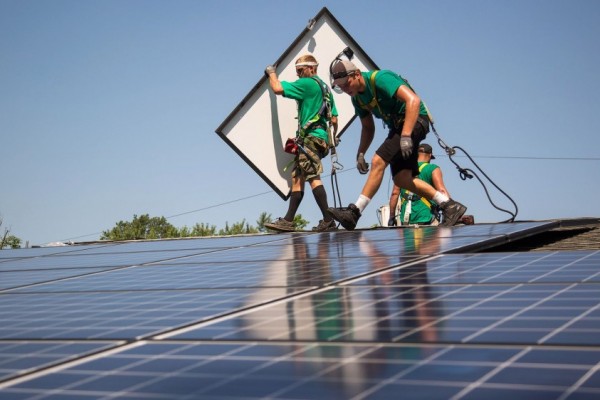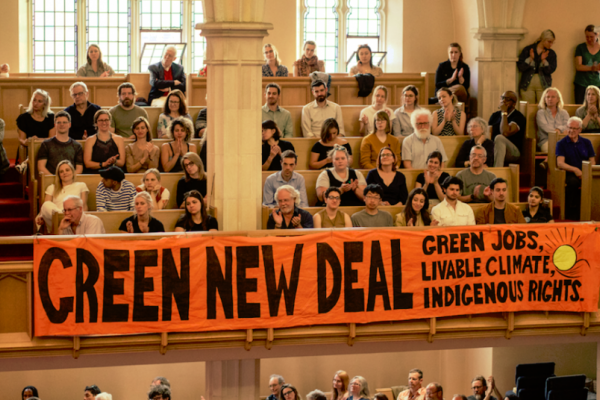Note to Justin Trudeau: Climate leaders don’t build pipelines

Protesters give Prime Minister Justin Trudeau pause during a town hall in Winnipeg. Photo by Saif Baloch.
If you’ve been following Prime Minister Justin Trudeau’s nationwide speaking tour, or if you live in Winnipeg and read the newspaper, you’re likely aware that during his stop in Winnipeg on Thursday, he was met by a group of about twenty disruptive climate justice and anti-pipeline protesters, of which I was a part. Our group was compelled to act for a number of reasons, such as the belief that Canada must adopt and implement the UN Declaration on the Rights of Indigenous Peoples and the belief that a just transition for oil sands workers to a renewable economy is possible, but most fundamentally that our society needs to take radical action to confront climate change.
This central belief is informed by the leading climate science of the Intergovernmental Panel on Climate Change, which demonstrates that we have less then five years at current emission levels before we lose even a 66 per cent chance at limiting global temperature rise to 1.5C above pre-industrial levels (something Trudeau committed to aiming for at the Paris Accord). The difference between 1.5C and 2C is, of course, whether places like the Marshall Islands will be swallowed by the ocean or not.
We were compelled to stand up and say no to even one large scale fossil fuel infrastructure project (which would expand the tar sands and thereby increase emissions), never mind the three that have been approved by the Liberal government and the two others that they have indicated they would like to build.
However, as we have found through various attempts to have our message heard by the new government since it first took power, it is extremely difficult to be listened to by a government that doesn’t want to hear what you have to say. In the first week of Liberal rule back in November 2015 we offered the Prime Minister anti-tar sands petitions, water samples from across the country, and free solar panels to affix to 24 Sussex Drive, but were ignored. At various town halls held by Natural Resources Minister Jim Carr we called on the government to make good on their campaign promise to revise the Harper-imposed rules for the National Energy Board before approving any new large scale fossil fuel infrastructure projects, and were ignored. When Climate Change and Environment Minister Catherine McKenna came to town for Canada Climate Action Plan consultations, we articulated group consensus among hundreds of people that we can not afford to build any more pipelines, and were ignored. The Liberals, after all their consultations, have approved a liquefied natural gas terminal, the Kinder Morgan Trans Mountain pipeline, and the Line Three pipeline. They’ve also indicated that they want to build the TransCanada Energy East Pipeline (which would cross directly over Winnipeg’s aqueduct), and work with US President Trump to build the Keystone XL pipeline, all while claiming to be fierce environmentalists.
So when our group heard that Trudeau was coming to town for a “listening” tour, we knew that we needed to do more then just ask a hard question. Yet regardless of the countless hours of planning that we put in, a few hiccups in our plan arguably caused us to lose some credibility in the eyes of the other audience members. With the aide of the platform afforded to us by Canadian Dimension, hopefully we can provide some context that may hopefully redeem us in the eyes of some.
The town hall wasn’t just about having our voices heard; we could have just waited for an opportunity to ask a question — indeed our members tried to ask a question — but we have also had our voices heard and ignored much too often. We wanted to be seen; to inject our narrative into the news coverage by making our presence know with signs, and more. And we also wanted to send a message to the government that we will make things very difficult for them if they continue to profit at the expense of our children’s future.
But town halls also serve as a catharsis for many people. As a small but significant way of holding our leaders accountable and in so doing to perhaps be sated by a modicum of justice. Our group understood that, and I’m disappointed that people think we didn’t. Indeed, a fact that has been decidedly left out of this discussion is that our group was very much informed by a commitment to the voices of others. So much so in fact, that one member, after being picked to ask a question by Trudeau, chose to give the question to a group of people that the PM had been ignoring, and who proceeded to ask an excellent question about inhumane living conditions on their reserve.
Riley McMurray interrupts Natural Resources minister Jim Carr’s presser in Februrary 2016. Photo by Anna Sigrithur.
The action we planned was intentionally meant to take place nearing the end of the question period; the cue was going to be when the moderator said “we have time for a couple more questions.” Our intention here was to allow others who were not part of our group the space to ask their questions and air their grievances. But we didn’t account for a pertinent question about climate change and pipelines asked by someone in the audience not affiliated with our group. When this happened, members of our group stood up with their signs — something we weren’t planning on doing until the end. This triggered the rest of us to do the same. As our plan was to be disruptive at the end after others had a chance to speak, we had rehearsed a number of chants in order to get our point across in conjunction with the canvass signs that we smuggled through in our pants.
As we were triggered early, the chants came off as very disruptive, which they were meant to be, and disrespectful of other members of the audience, which they were not meant to be. But how could we have avoided this? How would you have communicated to a disparate group of twenty that we were acting too early and that we should hold off? We discussed and planned for a very long time, but naturally could not anticipate and discuss how we would respond to every possible unforeseen scenario. Because we deployed early, Trudeau was able to leverage this and, aided by his important structural advantage of being the only one with a mic, was able to antagonize us in the minds of the crowd. Zoning in on one of our group members, he patronizingly asked for permission to continue without disruption, to which she replied “No!”
What would you do if you were stuck between your convictions and a professional public speaker singling you out and belabouring the fact that you interrupted him in order to turn others against you? You have three seconds to decide - you shout nothing and he puts you in your place. You shout something and you have violated the customs of polite society. Or perhaps you say something incredibly brilliant that smooths over the tension and brings people over to your side. Well? What did you say? Your three seconds are up.
The point is that we had a plan. The point is that we stood up. And it was arguably quite effective in spurring a discussion around pipelines — we were on the front page of the Winnipeg Free Press the next day with solid reportage for all of Winnipeg to consider. And even if we did end up putting our movement back a step, that is the price of action, of standing up. We’ve tried doing nothing. We’ve tried being polite. Have you tried being rude? If that is still outside of your decorum, join us in organizing so we can do better next time. Social change does not come from asking a politician a hard question, from a single moment of glory. Social change comes from sustained resistance by huge numbers of people over extended periods of time. Don’t let the powers-that-be-damned make you think you can only engage in democracy once every four years.
Join us as we fight for the radical notion that our children should inherit an inhabitable planet. Join us as we win.
Riley McMurray is an activist, student and writer based in Winnipeg. You can reach him at [email protected].










